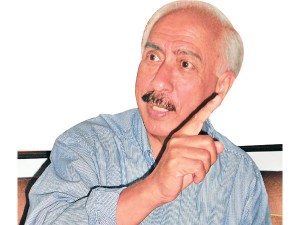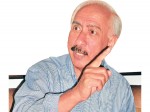Undoubtedly, we all agree that critical thinking is one of the life skills in the 21st century. However, there are debates and discussions on how this very skill should be included in education system so that students, from the very beginning of their schooling, learn this skill subconsciously and become rationale citizens. Also, there are controversies whether or not we can promote this skill in second or foreign language teaching and learning, for example, learning English in the context of Nepal. With a view to shedding lights on these issues, Lal Bahadur Rana, ELT Choutari coordinator for October issue, had a chit-chat with Prof. Kedar Bhakta Mathema, who is the forerunner of introducing the concept of critical thinking in Nepalese academia. Here is the excerpt :
Lal: Welcome to the October Issue of ELT Choutari. This special issue, we have focused on how critical thinking can be used in ELT. As the forerunner for the implementation of critical thinking in the context of Nepal, could you please tell us the how you conceived of it?
 Mathema: Well, thank you very much. It’s my pleasure to be interviewed for the special issue. Critical thinking is something important in an education system. I think for the past several years, since beginning, I would say, we have been putting emphasis on lower level of thinking such as recollection of facts. We never encouraged students to think independently and creatively. Similarly, we never encouraged students to synthesize or analyze anything. As far as English teaching is concerned, I remember my days at the university while teaching to the student in the faculty of education, I used to bring extracts from the newspapers such as Herald Tribune and New York Times and teach those texts to the students. Although these texts were very difficult for the learners, I would make them read. At first, very general questions such as What is the text all about? were asked. Later on, I would ask them difficult questions in the second, third, fourth or fifth reading, especially implied questions. When I was the Vice-chancellor of Tribhuvan University, I came to realize that our education system right form schools to university focused lower level of thinking. Then I thought of introducing critical thinking in the university. But, unfortunately, I somehow could not introduce there.
Mathema: Well, thank you very much. It’s my pleasure to be interviewed for the special issue. Critical thinking is something important in an education system. I think for the past several years, since beginning, I would say, we have been putting emphasis on lower level of thinking such as recollection of facts. We never encouraged students to think independently and creatively. Similarly, we never encouraged students to synthesize or analyze anything. As far as English teaching is concerned, I remember my days at the university while teaching to the student in the faculty of education, I used to bring extracts from the newspapers such as Herald Tribune and New York Times and teach those texts to the students. Although these texts were very difficult for the learners, I would make them read. At first, very general questions such as What is the text all about? were asked. Later on, I would ask them difficult questions in the second, third, fourth or fifth reading, especially implied questions. When I was the Vice-chancellor of Tribhuvan University, I came to realize that our education system right form schools to university focused lower level of thinking. Then I thought of introducing critical thinking in the university. But, unfortunately, I somehow could not introduce there.
Lal: You said that you tried to implement critical thinking pedagogy at TU. What factors caused you to try to implement at T. U.; not to other institutions?
Prof. Mathema: TU is the biggest institution of higher education in the country. About ninety percent students of Nepal would go to TU for their higher education. Likewise, there would be students from all over Nepal. It was very important that graduates from our university should be able to think independently, critique other people’s opinion. What is happening now is that students simply accept what is being taught to them by teachers. We should make students question even about the textbooks, for example, they many not like certain texts or paragraphs. In such a case, they should be allowed to express their ideas on what kind of text or paragraphs they would like to have and why. This is very important. We need the university graduates in bureaucracy, business or academia, etc. As a matter of fact, we need people who will be able to think creatively, ask questions, synthesize, make good analysis of a report or what ever it is. So this is very important that we should implement the concepts of critical thinking in all the levels of education system. At the moment, what is happening is that students are just formatting whatever is taught to them through the text or lecture. This is not acceptable, because it will not pave the way of intellectual development.
Lal: You have mentioned that the students have not developed higher order of thinking in them. What changes do you think are necessary both in policies and in practices so that learners would develop their higher order of thinking or critical thinking skills?
Prof. Mathema: Well, first of all, we should bring about changes in the examination system. In the examination, we should not only focus on recollection type of questions such as, how many chairs are there in this room? or who is the father of Rama?, etc. Instead, if we should ask higher order questions such as how do you think this problem can be resolved?. Such a question can make students think on their own without depending on textbooks or teacher’s opinions. Another thing that we need to change in order to promote critical thinking is the teaching learning procedure/ pedagogy. Instead of teachers lecturing all the time (what I would say narration sickness) and making students become passive listener or recipient of information, we ought to make them active. A teacher should just initiate something and make them think, reflect, speak, argue, counter argue, etc. This is something very important. In fact, students should be more active than teachers should. Teacher’s job is just to initiate certain discussion or certain questions. There ought to be radical reforms in the way we teach our students. May be, this also means we should bring about reforms in our textbooks. For example, they would read a story, an article, or a paragraph and we would ask higher order questions to them. I had tried to use this concept, many years ago, when I was fortunate enough to write the textbook for grade ten students. Towards the end of the book, I had included some implied questions, which would force students to think independently, but this was not pursued later on.
Lal: From the discussion we have until now, we realize that we need to bring about drastic changes in our teaching learning activities if we wish to implement critical thinking approach in our classrooms. So how far do you think the teacher will support such a change?
Prof. Mathema: I think they will support. It also depends on how we train them. Teachers should be given training or refresher training or orientation on how critical thinking approach can be implemented in classrooms. The teachers who have been teaching these days were taught using lecture method and therefore they use the same method of teaching for teaching their students. They should not think that lecture is the only way of teaching. Neither is it the best method of teaching. They should know as Paulo Freire said, “Students should be more active than teachers”. Students should control the class; rather than the teachers. In fact, they should be discussing, asking questions, may be asking very difficult questions that teachers don’t know. Therefore, they would say, “Sorry, I don’t know.” In this way, learners should be made bold enough to critique their teacher’s opinion. I think if teacher are given orientation or training on the procedure to follow, they would love it because their classes will be full of fun. The students will not have the feeling that teachers know everything. They know that their teacher have certain limitations. There can be students from various backgrounds. Therefore, in some cases, they may know much better than their teachers do.
Lal: Some people think that critical thinking is not possible in second language / foreign language teaching, for example, it may be possible in Nepali but may not in English. What do you think? Is it possible to promote critical thinking in teaching second language or foreign language?
Prof. Mathema: I think it is absolutely possible. Maybe, it is difficult at the beginning you may not use critical thinking but in higher level, for example, we can force them to think and express what they have been thinking. This is desirable I think, for example, you can ask certain questions. You can almost force students to think and express what they can think. This is the language, you know, learning a language is just not learning the structure and learning a language is also be able to create new sentences, using new sentences to express new ideas. This is the truth of language learning. At higher level, we can make language learners better speaker and better thinker.
Lal: If the concept of critical thinking is fully implemented in our ELT classrooms or overall education system, what prospect do you see in future? What kinds of citizens can we have in the days to come?
Prof. Mathema: We will have good citizens who will be asking questions. May be asking the questions to the political leaders. They will not just be the passive receivers, but will be able to raise vital questions such as asking why this is to be and why not. They will not accept whatever has been handed down to them. I think critical thinking method will help us to develop active citizenry. It will help us make the citizens active. I think this is important and help the democracy because democracy does not mean accepting everything handed down to the people and they will participate actively in decision-making process. They will not feel afraid of asking questions. So, it is very important to implement the critical thinking approach to develop good citizens of the country.

It is good to implement in higher level but a bit difficult in lower level. Our student
It is good for higher level but in lower level its quit difficult to implement.
Pleased to read the interview with the forward-looking thought leader of education in Nepal. I have enjoyed Prof. Kedar Bhakta Mathema’s thoughts and opinions. As a student at a foreign university, I can understand what the professor is talking about. It’s time that we took it seriously and incorporate critical thinking throughout our education system. Traditionally, we are stuck at putting our all efforts to get to “Oh, I see!” But that’s has limitations. It’s critical that we move on learn and encourage our students towards “Eureka!”. The only way forward is by integrating critical thinking skills in all levels of education so as to encourage them to ask bold questions, challenge, think, innovate, and create knowledge.